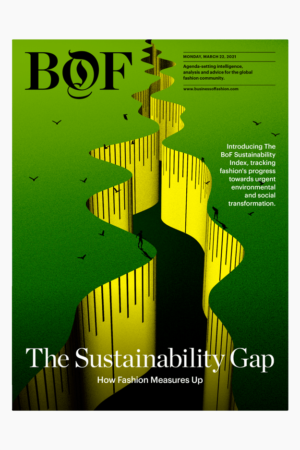Brands are talking about sustainability more than ever before, but does their rhetoric stand up to scrutiny? The Business of Fashion (BoF)’s new report, The BoF Sustainability Index, benchmarks 15 of the industry’s biggest companies against ambitious environmental and social goals and finds fashion is falling short. The inaugural BoF Sustainability Index tracks fashion’s progress towards ambitious sustainability targets for the coming decade. It examines public disclosures to rigorously benchmark performance and enable like-for-like comparisons at 15 of fashion’s largest companies. While fashion companies are speaking about sustainability more than ever before, BoF’s comprehensive analysis found actions are lagging public commitments, even among the industry’s largest and most highly resourced businesses. The average overall score of the companies assessed was just 36 out of a possible 100, with significant disparities between engagement and action. Overall, progress skews towards target setting, with data often self-reported and unverified, pointing to a wider accountability challenge.
 The global economy has 10 years to avoid catastrophic climate change and an urgent duty to improve the welfare of the workers who make it tick.
The global economy has 10 years to avoid catastrophic climate change and an urgent duty to improve the welfare of the workers who make it tick.
Fashion has a prominent role to play in solving these dual challenges, both because of its global scale and its cultural influence. While fashion brands have stepped up their commitments to operate more responsibly, measuring progress in a comparable, standardised way is a monumental task.
Like-for-like comparisons between companies are distorted by varying degrees of disclosures. Opaque working practices and fuzzy definitions of what constitutes “good” progress complicate matters further, creating a woolly picture of where the industry is at and what steps are required for it to clean up its act.
A new report from The Business of Fashion — The BoF Sustainability Index — aims to offer a transparent and trusted benchmark to track clearly defined, measurable progress. It employs a proprietary methodology to examine 15 of fashion’s largest companies as a proxy to measure overall industry headway.
While the months-long research and analysis found pockets of innovation and action, the average overall score of the companies assess was just 36 out of a possible 100 and substantial challenges still remain.
The index is built on over 5,000 data points gathered across the 15 companies included in this year’s edition.
Overall, the analysis revealed clear challenges and opportunities that must be resolved in the next decade if fashion is to align with global climate and sustainable development goals.
Discourse Outpaces Action: Companies need to move past target-setting to demonstrate tangible progress.
The Trust Deficit: Fashion needs to fix its misinformation problem with transparent supply chains and quality data
The Finance Gap: Companies are not matching bold ambitions with details of how they plan to pay for them.
The Growth Conundrum: Achieving commitments to reduce the industry’s footprint requires companies to disentangle growth from impact.
Collaboration with Clout: Impactful and inclusive industry-wide efforts are needed to drive swift progress beyond the current baseline.
A New Social Contract: Fashion must finally get to grips with systemic inequalities in its supply chain.
Pushing Boundaries: Pockets of innovation are emerging in areas like circularity and regenerative agriculture, creating fresh opportunities for positive change.
The aim of the Index is not to celebrate or chastise any company but to take stock of the progress that has been made, leverage data to objectively identify shortcomings and lay out a clear framework for future advancements.
The Index examines the five biggest public companies by annual revenue in three distinct fashion industry verticals — luxury, high street and sportswear. It uses 338 metrics across six categories to measure performance against 16 ambitious environmental and social targets set by The Business of Fashion in consultation with a group of respected global experts.
This report is the first in a series of analyses based on the The BoF Sustainability Index’s key findings that will publish in the lead-up to the United Nations Climate Change Conference to be held in Glasgow, UK from November 1-12, 2021.



